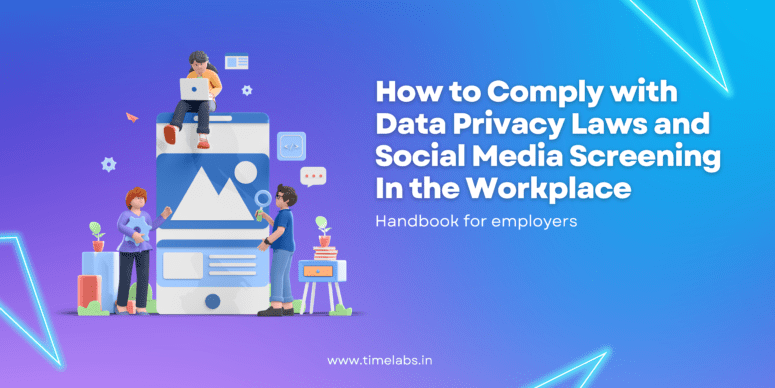Employers can learn about a candidate’s behavior through social media screening that they otherwise wouldn’t be able to learn through traditional means such as resumes and interviews. Candidates can exaggerate their qualifications and experience on resumes and act dishonestly in interviews. But what people reveal about themselves on social media provides a reliable glimpse into their character and whether or not their beliefs are congruent with the company.
Moreover, social media screening can support businesses in safeguarding their organization’s identity by reducing the likelihood of selecting applicants prone to posting content that could be detrimental to the corporate image.
Complying With The Rules And Laws
It’s a good idea for employers to check out candidates’ online profiles. Still, they should also be aware of and adhere to any privacy regulations that may be in place regarding social media. Understanding and following these regulations can help businesses avoid legal trouble in the future. Companies need to exercise caution when making hiring decisions based on what they find on social media. Much of what they uncover on profiles can lead them to discriminate illegally against prospects.
Many nations’ legislation forbids employers from rejecting applicants based on protected characteristics like race, color, sex, creed, national origin, age, disabilities, or genetic data. Such information on most people’s social accounts facilitates the unfair evaluation of job candidates and workers.
Employers should never consider a candidate’s race or ethnicity when making a recruitment decision. It’s essential to be mindful of how you’re utilizing social media when screening potential employees or applicants so that you don’t end yourself in legal trouble.
Social Media Screening: Common Business Applications
The following are a few examples of how businesses are using social media to their advantage:
Recruitment
Social networking sites are widely used in recruitment, with the vast majority of businesses actively engaging in this practice. Social media makes networking, talent acquisition, and job advertisements possible. Companies might use social networking sites to pose complex technical challenges to finding top candidates.
Recruiters can utilize CRM software to keep tabs on their interactions with passive applicants who aren’t actively looking for work. Thanks to specialized apps for smartphones, tablets, and other mobile devices, recruiters can save time and effort when conducting online research or communicating with one another. Professionals in the recruiting industry might also set up niche sites catering to candidates in particular fields.
Employee Engagement
When workers have access to information and believe their ideas are being considered, they are more likely to be invested in their work. Employers can use social media to inform their workforce and collect feedback.
Some businesses have created official Facebook pages to update their staff on company initiatives. One major perk is that staff members can respond to real-time announcements with questions and thoughts. Some companies keep their remote workers involved in regular meetings by posting updates on a company blog or sharing videos. Social media is a great way to swiftly share company news and get employees involved, making them feel more associated with the business and its mission.
External Communications
Brand awareness can be increased through the usage of social media by businesses. Many businesses now maintain an online profile on social media and business networking platforms like Facebook and LinkedIn. Executives frequently use social media, like Twitter or a blog, to share news and updates with their teams and followers. Yammer and other collaboration services are used by businesses to connect internal teams with external resources, including suppliers, customers, and subject matter experts.
Learning Applications
The use of social media is reshaping corporate education in fundamental ways. By embracing the millennial generation’s desire to work together and expand their knowledge, businesses may take advantage of the many benefits social media offers in the workplace.
Using social media, you can keep in touch with trainees before, during, and after a training session. However, businesses must adjust their approach to training and education. Training methods that prioritize the centralization of knowledge and top-down delivery of information are ineffective in the open, collaborative space of social media.
Final words
Businesses should use social media screening processes to avoid making inappropriate hires that could be detrimental to their bottom line and brand image. To ensure compliance with state and federal privacy regulations, you should consult legal counsel frequently and stay abreast of any changes.



